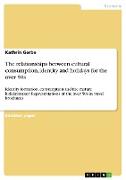The relationships between cultural consumption, identity and holidays for the over 50s
BücherAngebote / Angebote:
Seminar paper from the year 2007 in the subject Tourism, grade: 1, 0, University of Newcastle upon Tyne, course: Advertising and Consumption, 34 entries in the bibliography, language: English, abstract: For several decades now there has been a trend towards a declining birth rate and therefore rapid ageing of the British population. With good medical supplies, older people stay healthy and live longer: in the past twenty years life expectancy has risen from 70 years in 1981 to 75 years in 2001 for men, and from 76 to 80 years for women (Soule et al. 2005). When retiring in their 50 or 60s, people can expect to live twenty more years or longer. Soon people over 50, the post-war baby boomer generation born between 1946 and 1965, will constitute the majority of the population.
In contrast to people retiring in the 20th century, 21st century retirees are active and try to enjoy their leisure time. Although 'consumer society creates negative [...] images of later life, by implication, if not directly, by valuing and emphasizing youthful body image' (Morris 1998 in Bradley & Longino 2001, p.18), 'old' people immerse themselves in sports and other social activities, living life to the full.
Holidays play an important part in this lifestyle as they are important for the 'individual and social improvement and development, the resultant benefit of the self, including social self, being transportable back into the everyday environment as part of an ongoing life experience' (McIntyre 2007, p.121).
In the past decades, several travel operators have tried to buy into the mature market. They established brands for the over 50s, featuring names like First Choice's 'Leisurely Times', Thomson's 'Young at Heart', Cosmos' 'Golden Times' and Airtours' 'Golden Years' (Ylänne-McEwen 2000), all off which basically offered beach holidays around Europe. Now their brochures have vanished from the market. They either have been replaced by updated concepts or been incorporated into the 'mainstream' summer and winter brochures.
In this essay, I would like to explore why these travel programmes have been rejected by the young at heart and what kind of holidays has replaced them. I will have a critical look at the representation of the over 50s in the new brochures. I will deconstruct the mature holidaymaker, considering what they want and need of their holiday and which identity they derive from their activities and destination choice.
Folgt in ca. 10 Arbeitstagen
